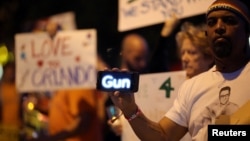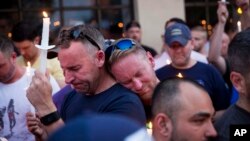For more than a decade, millions of people turned to social networking and media sites such as Twitter and Facebook to learn the latest news.
The massacre on Sunday at the Orlando nightclub Pulse was no different. For example, a Snapchat video by clubgoer Amanda Alvear that accidentally captured the first moments of gunfire inside the club quickly went viral, even before major news outlets began reporting on the attack.
Increasingly, especially in times of tragedy and trauma, social researchers say people turn to their online communities for news, for solace, to share painful experiences of confusion and sadness, and reach out to friends for emotional support and counsel.
Nothing about the Internet is purely good or bad, and those same social networks that can help bring people together can also often be used to drive them apart. In this instance, it took almost no time for acrimonious fights to start over placing the blame, the threats of Islamist terrorism, gun control, presidential politics and LGBT rights.
So, is social media a help or a hindrance in times of crisis and tragedy? The answer, perhaps unsurprisingly, is both.
Sharing and oversharing
“With social media, we can now connect with millions of people, including strangers, remotely,” says Tomas Chamorro-Premuzi, a business psychology professor at University College London and Columbia University. “Such a connection is mostly digital, but human imagination enables us to experience empathy, what other people feel, even when they are far away and we don’t know them.”
Chamorro-Premuzic says that social networks can function something like watching a sad movie: collectively, individuals can share their emotional responses together as part of a community. When overused, it can reduce profound, complex emotions and issues into talking points and babble.
“The perpetual need to overshare opinions and feelings does trivialize the expression of emotions over social media. It is not the same to lose a close friend than to change the profile picture of your Facebook page,” he told VOA.
“Social media is an amplified, yet more superficial, version of spending physical time with a close friend. Fundamentally, our emotions haven’t changed, but social media is used to broadcast them more widely. It is harder to suffer in private now. Everybody thinks they ought to share,” said Chamorro-Premuzic.
Another issue researchers are studying is how social media can rapidly drive individuals to their “safe spot,” the place they’re most comfortable personally and ideologically, and close off opinions that are different from their core values and beliefs.
This, says Charles Steinfeld, is especially true at moments of pain and confusion, such as with the Orlando massacre.
“Social media conversations tend to connect like-minded people, so it isn't as likely to bridge big ideological divides and is more likely to deepen divisions," says Steinfeld, a professor in the Department of Media and Information at Michigan State University.
But Steinfeld says that tendency is not a hard and fast rule.
“In many cases, our connections on social media may have arisen because of similarities in one area of our lives. For example, we work in the same company, but our views on other topics are different. So we do at times see people in our network of connections making statements that are inconsistent with our own views.”
Reinforcing belief and bias
One main problem with social media use during crises, said Tomas Chamorro-Premuzic, it that it enhances “confirmation bias,” or the tendency to seek out and listen to only that information that reinforces long-standing opinions.
“We mostly pay attention to those who think like we do,” he said. “It was no surprise to see that Facebook edits the news feed to promote liberal news, for most of its users are probably liberal.
Likewise, we like and share comments and content from those who share our views, which perpetuates a vicious cycle and makes people more narrow-minded."
“On social media it is more tempting to believe that our views are the truth, because we are only exposed to opposite views in small doses.”
And, says Steinfeld, confirmation bias affects not just the sources we seek out for news and information, but those we’re most likely to listen to and share.
“It's just more common that the people in our network tend to agree with us on the big issues - like gun control, abortion rights, immigration, and so on. So the discourse on these topics is more likely to be pretty one-sided within a person's social network,” he cautions.
Just hours after news began to circulate of the murder of 49 people at a gay nightclub in Orlando, millions of flame-filled arguments and accusations filled social networks of all sorts, all the while millions of others posted messages of condolence, support and love for all those touched by the shootings.
For those hurt or “unfriended” on social media in the wake of the tragedy, Tomas Chamorro-Premuzic says the best thing to do is put yourself first.
“There is no etiquette here if you are really hurt,” he said. “Do what makes you feel better. Mourning and grief are normal human emotions and they won’t get better or worse because of social media.”






